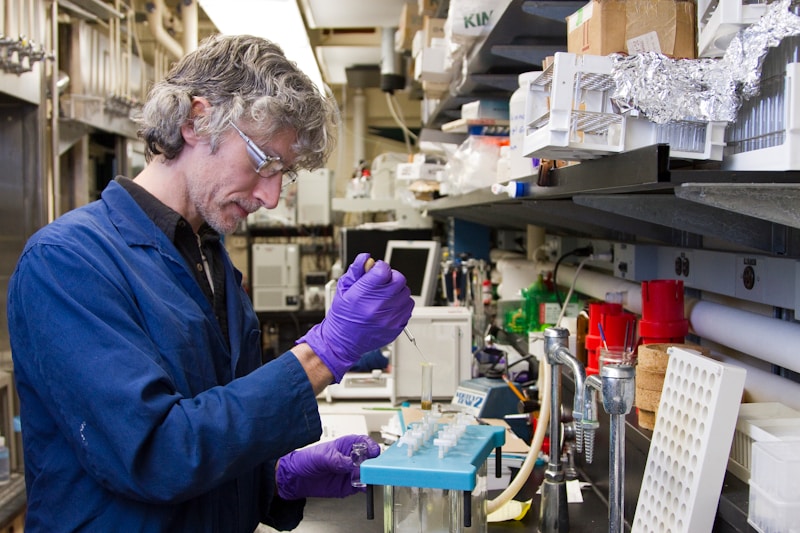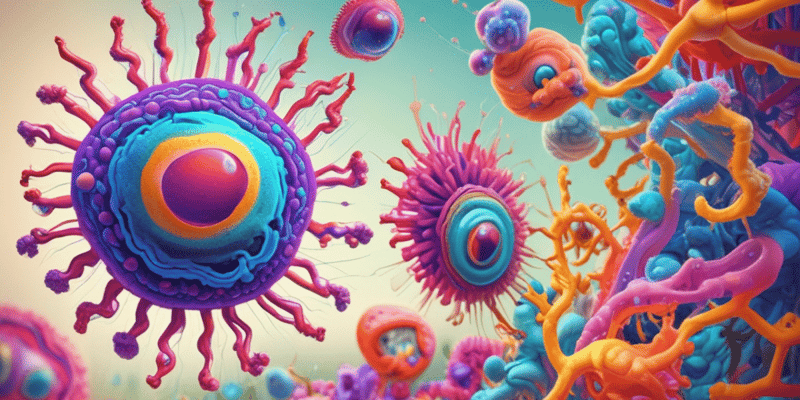Podcast
Questions and Answers
What helps scientists predict the consequences of deforestation, pollution, and climate change?
What helps scientists predict the consequences of deforestation, pollution, and climate change?
What does cellular machinery coordinate through regulated pathways?
What does cellular machinery coordinate through regulated pathways?
What field reveals humanity's evolutionary history?
What field reveals humanity's evolutionary history?
What do exciting discoveries in anthropology shed light on?
What do exciting discoveries in anthropology shed light on?
Signup and view all the answers
How does knowledge from studying molecular mechanisms benefit society?
How does knowledge from studying molecular mechanisms benefit society?
Signup and view all the answers
What efforts does the knowledge of biodiversity support?
What efforts does the knowledge of biodiversity support?
Signup and view all the answers
What is the main function of cells in living organisms?
What is the main function of cells in living organisms?
Signup and view all the answers
How do genetic mutations and recombination contribute to evolution?
How do genetic mutations and recombination contribute to evolution?
Signup and view all the answers
Which branch of science delves into life, its processes, and interactions with the world?
Which branch of science delves into life, its processes, and interactions with the world?
Signup and view all the answers
What is the impact of genetics on modern medicine?
What is the impact of genetics on modern medicine?
Signup and view all the answers
What do genes serve as in living organisms?
What do genes serve as in living organisms?
Signup and view all the answers
In ecological systems, what shapes population dynamics?
In ecological systems, what shapes population dynamics?
Signup and view all the answers
Study Notes
Exploring Science through Biology's Lens
Biology is an exciting branch of science that delves into life, its processes, and interactions with our world. With over three decades of accelerated discovery and a vast body of knowledge amassed, here we'll explore how biological sciences have advanced our understanding of living organisms and uncovered myriad mysteries.
Cellular Life
At the foundation of every living entity—from microscopic bacteria to multicellular plants and animals like us—lies cells. These tiny compartments perform essential functions such as converting nutrients into energy through cellular respiration and synthesizing proteins using DNA information encoded by genes. Many fundamental principles were established during the centuries-long quest to understand these building blocks of life.
Genetics & Evolution
Genes, made up of DNA, serve as blueprints for creating functional molecules within cells. Scientists now know that genetic mutations and recombination drive evolution; species change over time due to natural selection favoring advantageous traits. This theory has transformed modern medicine, impacting fields from pharmacogenomics—tailored drug treatments based on individual genotypes—to gene editing technologies like CRISPR.
Ecological Systems
Living beings interact with their surroundings via complex ecological networks where cooperation, competition, predator-prey relationships, and mutualism shape population dynamics. Understanding ecosystems helps scientists predict the consequences of human activities such as deforestation, pollution, and climate change.
Molecular Pathways
Cellular machinery operates by coordinating thousands of protein molecules through regulated pathways. Insights gleaned from studying molecular mechanisms underlie our comprehension of conditions ranging from viral diseases to cancer, providing clues to potential therapies.
Human Origins & Diversity
The study of anthropology, paleontology, and comparative anatomy seeks to reveal humanity's evolutionary history. Exciting discoveries shed light on our ancestors' behavior, diet, and lifestyles while confirming our shared ancestry with other primates. This knowledge strengthens efforts aimed at safeguarding biodiversity, supporting conservation initiatives, and protecting endangered species.
In summary, biology overlaps with many scientific disciplines, offering intriguing perspectives regarding the workings of life itself. By probing this domain further, researchers continue to expand the frontiers of knowledge, ultimately benefitting society through technological advancement and increased awareness of environmental concerns.
Studying That Suits You
Use AI to generate personalized quizzes and flashcards to suit your learning preferences.
Description
Dive into the fascinating realm of biology as it uncovers the secrets of life through cellular processes, genetic inheritance, ecological systems, and the origins of humanity. Discover how the study of biology influences modern medicine, environmental conservation, and technological advancements.



